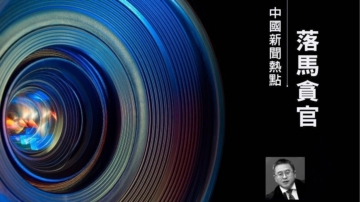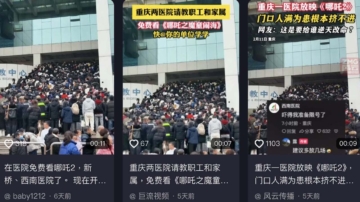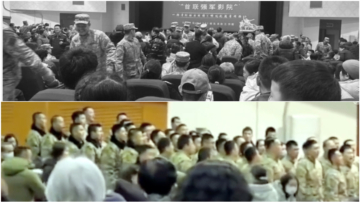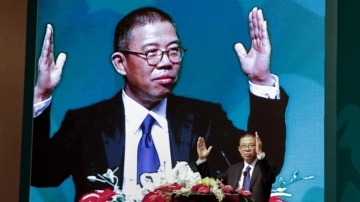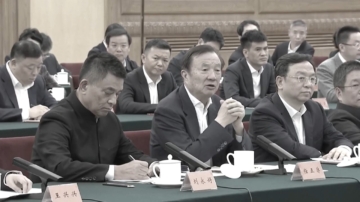【新唐人2014年04月09日訊】近年來,大陸各地醫患矛盾日益尖銳,暴力衝突頻發。發生在去年10月25號的浙江「溫嶺殺醫案」,更是一度將醫患關係推上了輿論的風口浪尖。日前,「溫嶺殺醫案」在浙江臺州進行了二審公開審判,被告上訴被駁回,維持一審死刑判決。數十萬網民因此投入一場醫患關係的熱烈討論。
浙江省高級人民法院在4月1號對「溫嶺殺醫案」進行了二審公開宣判,法庭駁回被告人連恩青的上訴,維持一審死刑判決。
二審判決結果一公開,民眾紛紛指責法院對連恩青量刑過重。
造成1死2傷的「溫嶺殺醫案」,今年1月22號,檢方以故意殺人罪起訴連恩青,雖然辯護律師表示連恩青有精神疾病,但他自己否認。
大陸東南大學法學院教授張讚寧:「可以適當的考慮(精神病),對殺人者在量刑的時候適當從輕。但是我是絕對反對殺醫的,但是一旦發生了,法院不應當變作一人堂,如果他確實有精神障礙的問題,那應當是免除死刑的。」
2012年3月20號,連恩青為了治療鼻炎,在溫嶺市人民醫院做了手術,術後幾個月他感覺自己的病情沒有好轉,反而加重,為了解決問題,他多次投訴醫院,尋找主治醫生,要求治好他的病,醫院也曾組織院內、院外的專家會診,期間出具的種種醫學數據都顯示手術成功,沒有再做手術的必要,但連恩青並不認可。
連恩青在二審判決後第二天,接受《央視》獨家專訪。連恩青表示,自己之所以殺人,是希望以這種方式把醫院的黑幕揭露出來,讓有同樣遭遇的人可以得到應有的治療。當記者問到連恩青是否認為自己做錯了時,連恩青回答:我無悔,只有遺憾,我沒能揭露它那用虛假謊言所掩蓋的面紗。
專訪播出後,引發巨大爭議,網站評論人數短短幾天達到了10萬以上。
大部分觀點認為,醫患糾紛的發生,更多責任在於院方,而不是患者。其中,醫療事故頻發、醫生醫德缺失、收回扣、收紅包、開貴藥、假藥等等醫療腐敗和黑幕,都是造成醫患矛盾的主要原因。而執法不公又使得醫方責任很難被追究,造成矛盾進一步升級,最終爆發。
但也有觀點認為,醫患矛盾責任不僅僅在於醫院或醫護人員本身,更多的責任應當歸結於醫療保障制度不合理、醫療行業市場化等制度性問題。
張讚寧:「我們國家對醫保投入實在是太少太少了,一旦治療失敗,往往對病人產生了人財兩空的結局,這個對病人是難接受的。如果政府對醫保的投入高一點,至少不要對病人造成人財兩空的局面,那麼這個矛盾可能就不會那麼尖銳,就不會去殺醫,所以這個還是個制度性問題。」
張讚寧指出,政府將原本屬於公共服務領域的醫療行業進行市場化,是造成醫療腐敗的主要原因,同時也將矛盾轉嫁給了醫療機構和醫務人員。
張讚寧:「改革開放30年,把醫療這一塊推向了市場,這是一個極大的錯誤。任何一個國家醫療都不是一個市場,都是靠國家為主要投入的,但是我們大陸醫療它作為一個市場來做,這樣就產生了醫生多檢查、多下藥、下貴藥。我想這麼少的醫療保險的投入,實際上是把民眾與政府之間的矛盾就轉嫁到了醫院和醫生的頭上。」
此外,也有評論指出,在中國大陸,除了醫患衝突,教育、科技、文化等多個領域都在發生著同樣的矛盾和糾紛,社會整體道德下滑、信任度不足、個體的暴戾化傾向都在加劇整個社會的暴力。
張讚寧:「我們黨文化歷來教育民眾要仇恨的,甚麼牢記階級苦,不忘血淚仇。這個黨文化的教育都是仇恨的,血腥的、冷漠的。」
令人遺憾的是,民間和專家學者提出的解決醫患矛盾建議,並沒有引起重視,浙江當局出臺的防範措施,僅僅是「增配醫院安保人員」。
採訪編輯/張天宇 後製/李勇
Doctoral Murder: One hundred thousand Internet users
accuse trial results
In recent years, acute contradictions and violence between
doctors and patients in China, occurs on a frequent basis.
Especially the "Wenling doctoral murder case" of last
Oct. 25 2013,
where the relationship between doctor and patient was
pushed to its breaking point.
Recently, this case was conducted in an open trial of second
instance in Taizhou, Zhejiang,
whereby the case is illustrated, proven or disproved.
The defendants appeal was dismissed.
The court upheld the death sentence. Hundreds of
thousands of Internet users joined in the lively
discussion of doctor-patient relationship.
On April 1, the Higher People's Court in Zhejiang conducted
a secondary trial on the "Wenling doctoral murder case".
The court rejected the defendant – Lian Enqing's appeal and
upheld the death sentence.
After the verdicts announcment, the public accused the
court for its heavy handed sentencing on Lian Enqing.
The "Wenling doctoral murder case" resulted in one
death and two injuries.
On Jan. 22 this year, the courts prosecuted
Lian Enqing with intentional homicide.
The defense lawyers said Lian Enqing had mental illness,
but Lian denied this.
Zhang Zanning, Law School professor from Southeast
University in China:
"This psychosis should be considered in the correct manner.
For instance, a lighter sentencing for Lian
I am against the killing of doctors. If this is allowed to go ahead,
the courts will become a unified church, one church.
If Lian does have a mental disorder, he should be exempt from
the death penalty."
On Mar. 20, 2012, Lian carried out a surgical procedure for the
treatment of rhinitis in Wenling People's Hospital.
A few months after the surgery, Lian felt his condition had
not made any improvement.
He made frequent complaints to the hospital, saying he wanted
another doctor to undertake the procedure again.
Yet the hospital arranged an expert analysis where
various medical data, showed the operation was a success.
It also claimed there was no need for further surgery,
Lian refuted this endorsement.
Lian Enqing accepted "CCTV's" exclusive interview the
day after the trial.
Lian said he'd hoped to expose the hospitals underhandedness
which eventually resulted in the death of the patient.
Lian hoped people with the same experiences can get
proper treatment in the future.
When a reporter asked whether he thought he had done wrong,
Lian replied: I have no regrets.
The only regret is that I could not reveal the hospitals
shady way of concealing the truth.
The interview caused enormous controversy. Internet
reviews reached a massive 10 million in just a few days.
According to the majority of reviews, the hospital should take
more responsibility on the occurrence of medical disputes,
instead of the patient.
The main causes for conflicts between doctors and patients,
include frequent malpractice,
a lack of medical ethics, kickbacks, expensive and fake drugs
and other medical corruptions.
The denial of justice also makes it difficult to investigate the
hospital concerned,
resulting in further escalation and outbreaks of conflict.
There are also points of view claiming it is the responsibility
of the medical profession,
to ease conflict between doctor and patient. In fact it goes
deeper than this.
More responsibility is attributable to the unreasonable
market-oriented health care system.
Zhang Zanning: "The investment in health care in our country
is way too little.
Once the treatment fails, the patient often has nothing left,
which is difficult for the patient to accept.
If the government put a little more emphasis upon health insurance,
the situation would rapidly change for the better for the patient.
We would then not see such sharp contradictions, including the
doctoral murder. This was an institutional problem."
Zhang Zaning pointed out that the government threw the
healthcare system into the market,
which originally belonged to the public service. This is the main
reason for health service corruption.
It also passed on this contradictory issue to the medical
institutions and medical personnel.
Zhang Zaning: "The 30 years'reform pushed the health care
system into the market, which is a big mistake.
Most of the health care systems in the world today, are mainly
invested in by the government.
However, the health care belongs to the market in China,
which leads to multiple checking, extensive and
expensive drugs.
Such little health insurance, actually passed on all the
contradictions between public and government,
onto the hospitals and doctors."
There are also comments which mentioned, in addition to
the conflict between doctor and patient,
the same conflicts and disputes existed in many fields in China,
such as education, science and culture, etc.
The moral decline, lack of trust and the tendency of violent
individuals, has exacerbated the violence in the whole of society.
Zhang Zanning: "The CCP culture has always been used to
educate the public to hate others,
such as to keep in mind the class pain, not forgetting the blood
and tears. The CCP culture is one of hatred, bloody and cold."
Many experts provided several solutions to the conflicts
between doctors and patients.
Regrettably, these solutions did not draw any attention.
The precautionary measures issued by Zhejiang authorities,
were merely put in place to add in the security guard.
More security, more suppression and more control.
Interview & Edit/Zhang Tianyu Post-Production/Li Yong
浙江省高級人民法院在4月1號對「溫嶺殺醫案」進行了二審公開宣判,法庭駁回被告人連恩青的上訴,維持一審死刑判決。
二審判決結果一公開,民眾紛紛指責法院對連恩青量刑過重。
造成1死2傷的「溫嶺殺醫案」,今年1月22號,檢方以故意殺人罪起訴連恩青,雖然辯護律師表示連恩青有精神疾病,但他自己否認。
大陸東南大學法學院教授張讚寧:「可以適當的考慮(精神病),對殺人者在量刑的時候適當從輕。但是我是絕對反對殺醫的,但是一旦發生了,法院不應當變作一人堂,如果他確實有精神障礙的問題,那應當是免除死刑的。」
2012年3月20號,連恩青為了治療鼻炎,在溫嶺市人民醫院做了手術,術後幾個月他感覺自己的病情沒有好轉,反而加重,為了解決問題,他多次投訴醫院,尋找主治醫生,要求治好他的病,醫院也曾組織院內、院外的專家會診,期間出具的種種醫學數據都顯示手術成功,沒有再做手術的必要,但連恩青並不認可。
連恩青在二審判決後第二天,接受《央視》獨家專訪。連恩青表示,自己之所以殺人,是希望以這種方式把醫院的黑幕揭露出來,讓有同樣遭遇的人可以得到應有的治療。當記者問到連恩青是否認為自己做錯了時,連恩青回答:我無悔,只有遺憾,我沒能揭露它那用虛假謊言所掩蓋的面紗。
專訪播出後,引發巨大爭議,網站評論人數短短幾天達到了10萬以上。
大部分觀點認為,醫患糾紛的發生,更多責任在於院方,而不是患者。其中,醫療事故頻發、醫生醫德缺失、收回扣、收紅包、開貴藥、假藥等等醫療腐敗和黑幕,都是造成醫患矛盾的主要原因。而執法不公又使得醫方責任很難被追究,造成矛盾進一步升級,最終爆發。
但也有觀點認為,醫患矛盾責任不僅僅在於醫院或醫護人員本身,更多的責任應當歸結於醫療保障制度不合理、醫療行業市場化等制度性問題。
張讚寧:「我們國家對醫保投入實在是太少太少了,一旦治療失敗,往往對病人產生了人財兩空的結局,這個對病人是難接受的。如果政府對醫保的投入高一點,至少不要對病人造成人財兩空的局面,那麼這個矛盾可能就不會那麼尖銳,就不會去殺醫,所以這個還是個制度性問題。」
張讚寧指出,政府將原本屬於公共服務領域的醫療行業進行市場化,是造成醫療腐敗的主要原因,同時也將矛盾轉嫁給了醫療機構和醫務人員。
張讚寧:「改革開放30年,把醫療這一塊推向了市場,這是一個極大的錯誤。任何一個國家醫療都不是一個市場,都是靠國家為主要投入的,但是我們大陸醫療它作為一個市場來做,這樣就產生了醫生多檢查、多下藥、下貴藥。我想這麼少的醫療保險的投入,實際上是把民眾與政府之間的矛盾就轉嫁到了醫院和醫生的頭上。」
此外,也有評論指出,在中國大陸,除了醫患衝突,教育、科技、文化等多個領域都在發生著同樣的矛盾和糾紛,社會整體道德下滑、信任度不足、個體的暴戾化傾向都在加劇整個社會的暴力。
張讚寧:「我們黨文化歷來教育民眾要仇恨的,甚麼牢記階級苦,不忘血淚仇。這個黨文化的教育都是仇恨的,血腥的、冷漠的。」
令人遺憾的是,民間和專家學者提出的解決醫患矛盾建議,並沒有引起重視,浙江當局出臺的防範措施,僅僅是「增配醫院安保人員」。
採訪編輯/張天宇 後製/李勇
Doctoral Murder: One hundred thousand Internet users
accuse trial results
In recent years, acute contradictions and violence between
doctors and patients in China, occurs on a frequent basis.
Especially the "Wenling doctoral murder case" of last
Oct. 25 2013,
where the relationship between doctor and patient was
pushed to its breaking point.
Recently, this case was conducted in an open trial of second
instance in Taizhou, Zhejiang,
whereby the case is illustrated, proven or disproved.
The defendants appeal was dismissed.
The court upheld the death sentence. Hundreds of
thousands of Internet users joined in the lively
discussion of doctor-patient relationship.
On April 1, the Higher People's Court in Zhejiang conducted
a secondary trial on the "Wenling doctoral murder case".
The court rejected the defendant – Lian Enqing's appeal and
upheld the death sentence.
After the verdicts announcment, the public accused the
court for its heavy handed sentencing on Lian Enqing.
The "Wenling doctoral murder case" resulted in one
death and two injuries.
On Jan. 22 this year, the courts prosecuted
Lian Enqing with intentional homicide.
The defense lawyers said Lian Enqing had mental illness,
but Lian denied this.
Zhang Zanning, Law School professor from Southeast
University in China:
"This psychosis should be considered in the correct manner.
For instance, a lighter sentencing for Lian
I am against the killing of doctors. If this is allowed to go ahead,
the courts will become a unified church, one church.
If Lian does have a mental disorder, he should be exempt from
the death penalty."
On Mar. 20, 2012, Lian carried out a surgical procedure for the
treatment of rhinitis in Wenling People's Hospital.
A few months after the surgery, Lian felt his condition had
not made any improvement.
He made frequent complaints to the hospital, saying he wanted
another doctor to undertake the procedure again.
Yet the hospital arranged an expert analysis where
various medical data, showed the operation was a success.
It also claimed there was no need for further surgery,
Lian refuted this endorsement.
Lian Enqing accepted "CCTV's" exclusive interview the
day after the trial.
Lian said he'd hoped to expose the hospitals underhandedness
which eventually resulted in the death of the patient.
Lian hoped people with the same experiences can get
proper treatment in the future.
When a reporter asked whether he thought he had done wrong,
Lian replied: I have no regrets.
The only regret is that I could not reveal the hospitals
shady way of concealing the truth.
The interview caused enormous controversy. Internet
reviews reached a massive 10 million in just a few days.
According to the majority of reviews, the hospital should take
more responsibility on the occurrence of medical disputes,
instead of the patient.
The main causes for conflicts between doctors and patients,
include frequent malpractice,
a lack of medical ethics, kickbacks, expensive and fake drugs
and other medical corruptions.
The denial of justice also makes it difficult to investigate the
hospital concerned,
resulting in further escalation and outbreaks of conflict.
There are also points of view claiming it is the responsibility
of the medical profession,
to ease conflict between doctor and patient. In fact it goes
deeper than this.
More responsibility is attributable to the unreasonable
market-oriented health care system.
Zhang Zanning: "The investment in health care in our country
is way too little.
Once the treatment fails, the patient often has nothing left,
which is difficult for the patient to accept.
If the government put a little more emphasis upon health insurance,
the situation would rapidly change for the better for the patient.
We would then not see such sharp contradictions, including the
doctoral murder. This was an institutional problem."
Zhang Zaning pointed out that the government threw the
healthcare system into the market,
which originally belonged to the public service. This is the main
reason for health service corruption.
It also passed on this contradictory issue to the medical
institutions and medical personnel.
Zhang Zaning: "The 30 years'reform pushed the health care
system into the market, which is a big mistake.
Most of the health care systems in the world today, are mainly
invested in by the government.
However, the health care belongs to the market in China,
which leads to multiple checking, extensive and
expensive drugs.
Such little health insurance, actually passed on all the
contradictions between public and government,
onto the hospitals and doctors."
There are also comments which mentioned, in addition to
the conflict between doctor and patient,
the same conflicts and disputes existed in many fields in China,
such as education, science and culture, etc.
The moral decline, lack of trust and the tendency of violent
individuals, has exacerbated the violence in the whole of society.
Zhang Zanning: "The CCP culture has always been used to
educate the public to hate others,
such as to keep in mind the class pain, not forgetting the blood
and tears. The CCP culture is one of hatred, bloody and cold."
Many experts provided several solutions to the conflicts
between doctors and patients.
Regrettably, these solutions did not draw any attention.
The precautionary measures issued by Zhejiang authorities,
were merely put in place to add in the security guard.
More security, more suppression and more control.
Interview & Edit/Zhang Tianyu Post-Production/Li Yong

